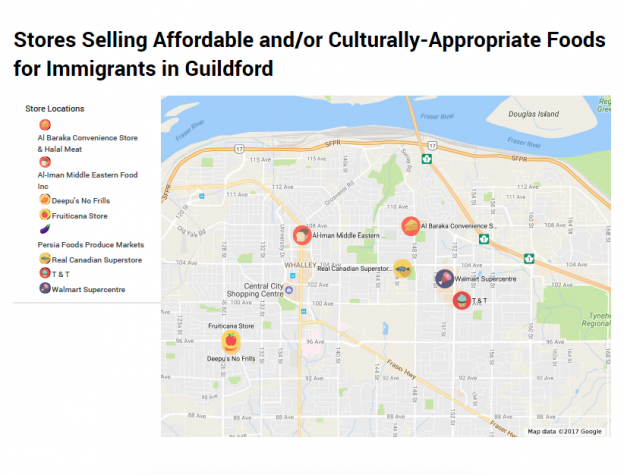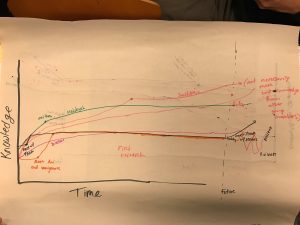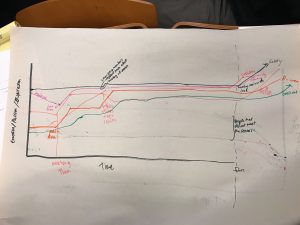Using Rolfe et al.’s (2001) reflective model to assess the project experience:
What?
The main focus of LFS 350 was to provide an opportunity for us as students to engage in the community and gain hands-on experience working with issues of community food security in a community setting. Our group gained this experience by working with the Immigrant Services Society of British Columbia (ISS of BC) and immigrant seniors living in the Guildford area to create an asset map to help address food insecurity issues within the Arabic-speaking immigrant community in the Guildford area. Our role as an LFS 350 team was to gather information from Arabic-speaking group of seniors living in the area so as to construct an asset map which could be used by new immigrants in the Guildford area to locate stores providing affordable and culturally-appropriate foods.
The primary roadblocks faced by the group were due to communication issues. Our primary means of communication was through email and it took time to communicate with the community partners and coordinate meetings with the seniors and ISS of BC. We also experienced minor difficulties when planning for the cooking session with the seniors. For example, it was difficult to decide who would grocery shop as everyone had extremely busy schedules and most of us commuted. We overcame this by dividing the work such that students living on or near campus completed the shopping.
This was a great learning experience for us in terms of planning. As Shulman mentions, “without a certain amount of anxiety and risk […] there’s a limit to how much learning occurs” (Shulman, 2005).
In this way, Shulman (2005) asserts that professional education contributes to skilled professional practice, and learning will be limited without uncertainty present in the process. In turn, we faced the risk of failing to recognize the knowledge and work of the seniors as well as the needs of ISS of BC via creating an insufficient map product. The completed map product will hopefully assist new immigrants to Canada, which thus places a higher degree of anxiety and risk upon the project process.
So what?
This experience taught us that we should have better deadlines and all group members should respond to new sources of information provided by the community members punctually so that the person communicating with the community partner could make plans with the community partner involving the group as a whole. The experience also taught us that communication and research involving large groups of people may be dynamic and require changes in inquiry strategy. As Steven Levitt argues in the podcast Failure is Your Friend, through failure success will eventually emerge (Cohn, 2015). For instance, the initial approach of asking open-ended questions to the group of seniors proved inefficient and it was necessary to develop an alternative system of data collection via a tally/vote system which was successful.
Now what?
Ultimately, our group achieved a successful outcome via gathering beneficial knowledge from the seniors and providing the ISS of BC with an asset map of affordable/culturally-appropriate food resources in the Guildford region. In future group work, one of the responsibilities of one or several of the individuals could be to design an allocation of responsibilities for each individual group member based on relative strengths of the individual group members. According to Phillips (2014), a group of diverse people are more open minded and capable of solving tough challenges. The person coordinating the allocation of tasks could take Phillips’s argument into account via sending a survey to each group member regarding personal strengths and using the course calendar and list of assignments to create a task list for each group member suited to each group member’s potential for contribution to the project. By creating a collaborative work environment, we can create positive, significant and long-term differences in communities.
In turn, further beneficial work may be done by working further with the seniors to identify knowledge from the community which may be beneficial to new immigrants and to further assess food resources throughout the lower mainland in terms of affordability and cultural appropriateness to a variety of groups from different ethnicities and cultural backgrounds. The usefulness of the asset map will need to be tested (ie via feedback from new immigrants) and subsequent refinements to the asset map could be made to better serve the community. In turn, changes in the distribution of food assets will need to be incorporated into the map so as to ensure the longevity of the map’s utility in serving new immigrants. By continuing to recognize the knowledge present in the immigrant community in Surrey, efforts to map food assets can be bolstered via the identification of successful strategies and map layouts and the incorporation of further experiences of new immigrants to the area to combat food insecurity for new immigrants to Canada.
Works cited:
Cohn, G. (2015, May 20). Failure is Your Friend. Retrieved from http://freakonomics.com/podcast/failure-is-your-friend-a-freakonomics-radio-rebroadcast/
Phillips, K. W. (2014). How Diversity Makes Us Smarter. Retrieved August 24, 2016, from http://www.scientificamerican.com/article/how-diversity-makes-us-smarter/
Rolfe, G., Freshwater, D. and Jasper, M. (2001). Critical reflection in nursing and the helping professions: a user’s guide. Basingstoke: Palgrave Macmillan.
Shulman, L. S. (2005). Pedagogies of uncertainty. Liberal Education, 91(2), 18–25. Retrieved from http://files.eric.ed.gov/fulltext/EJ697350.pdf


